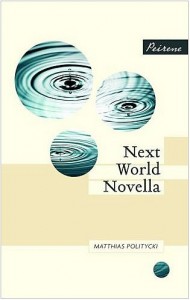I finished this 138-page novella in one evening and thoroughly enjoyed it. The book opens with Hinrich Schepp discovering the dead body of his wife Doro. She has been editing an old manuscript of his, a novel he started writing before they met and quickly abandoned. Through her scathing margin notes he discovers an entirely different side to her, and to their 29-year marriage.
So the story is told through his reading of the manuscript and Doro’s notes on it. The story of the aborted novel bears a striking resemblance to a recent incident in Hinrich’s own life, an infatuation with a waitress in a bar, except that in the novel version the male character is more heroic. As he reads Doro’s notes and corrections, he understands that she knew all about the things he thought he had kept secret.
Hinrich also thinks back to how he met Doro and their early life together, and so we get a wonderful insight into how relationships can change over decades. I loved how Hinrich’s laser eye surgery changed his behaviour, making him notice things in life that were blurred for so many years, things like the beautiful waitress in the bar with the mysterious I Ching character on her neck. The operation that was meant to improve his life ended up destroying his peace of mind, as he chased experiences he felt he’d missed out on before, and in reaching for things that were far away he lost the things that were close to him, like his intimacy and love for his wife.
Click here to see more books I’ve reviewed.
There are a couple of nice twists towards the end that I won’t give away here. They contribute to the sense that this is a very carefully constructed novella, one in which more or less nothing happens in the ‘present’, other than Hinrich finding his wife’s body and reading the manuscript, but in which a lot of ground is covered in retrospect. Still it’s a thoughtful, meditative kind of book rather than a plot-driven one. The author has a lot to say about the nature of love and relationships, and says it very effectively. It becomes clear, for example, why Doro couldn’t talk to him about any of these things when she was alive – as he is reading, Hinrich at first denies and then rebuts and only in the end concedes the truth. I felt the intense sadness of Hinrich and Doro’s inability to communicate, and the way it erodes their marriage and turns love to hate. One of the twists at the end sheds a more positive light on this, but I promised I wouldn’t talk about it so I won’t.
This is the 4th book published by Peirene Press and I have enjoyed all of them. It is quite amazing to me – I keep waiting for the dud, but it hasn’t arrived yet. I feel the need to point out that all these positive reviews are entirely genuine – I have no connection to Peirene Press whatsoever. Certainly the type of book they publish – contemporary European literary novellas – appeals to me greatly, but still you wouldn’t expect every book to hit the mark. Anyway, I’m glad they have. Roll on number 5!
Click here to read other people’s reviews of Next World Novella on Amazon.




There are 3 comments
I thought this was a wonderful, multi-layered, multi-angled novel. All of Peirene’s books have been special in their own way and I just hope you’re wrong expecting one to turn out a dud.
Thanks Maryom. Yes, definitely hope I’m wrong about that! It just seems so unlikely that a publisher could put out so many books that I like!